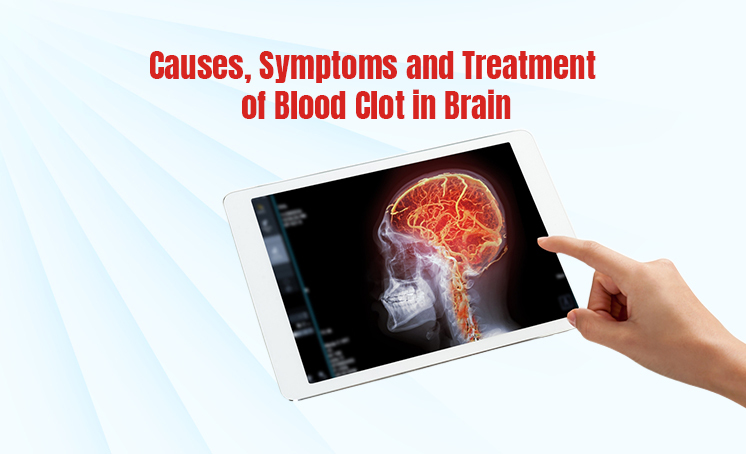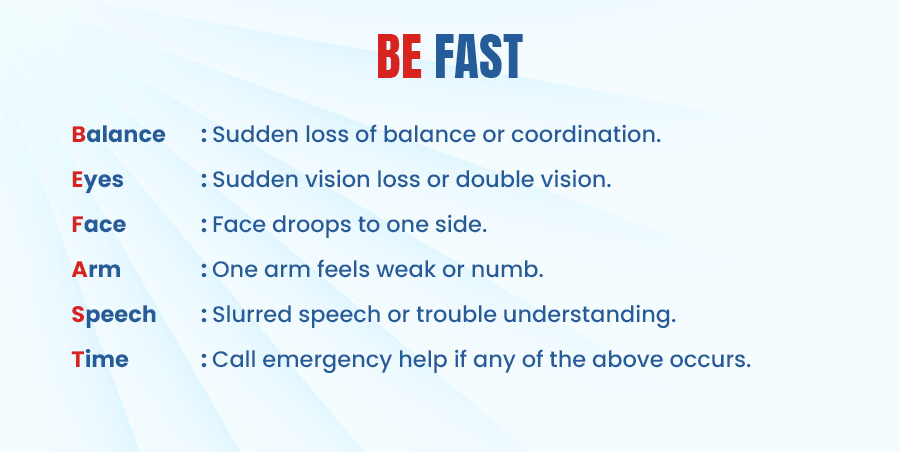Blood Clot in Brain: Reason, Causes, Symptoms & Treatment

A blood clot in the brain blocks normal blood flow. Blood carries oxygen and nutrients to brain cells. When a clot blocks this flow, those brain cells begin to die within minutes. This can lead to a stroke, paralysis or even loss of consciousness. The damage can be temporary or permanent, depending on how fast treatment begins.
When oxygen supply drops, the brain’s command signals to the body begin to fail. This is why slurred speech, weakness or confusion appear suddenly and without warning.
In simple terms, a blood clot is like a traffic jam inside your brain’s highways. Blood flow stops, pressure builds and parts of the brain get cut off. If the blockage is not cleared quickly, the “traffic” never moves again and brain cells in that area are lost forever. That’s why quick recognition and emergency care are critical.
At PSRI Hospital we offer round-the-clock stroke care, a specialized neuro ICU support and advanced brain imaging for such emergencies. Our dedicated team of neurologists, neurosurgeons and critical care experts works together to restore blood flow, protect the brain and prevent complications.
Let’s understand everything about blood clot in brain clearly and how treatment works
Reasons: Why Does a Blood Clot Form in The Brain?
A brain clot forms when blood thickens and clumps inside a vessel. It can start in the brain’s arteries or veins. Sometimes it forms in the neck or heart and travels to the brain. Either way, the clot blocks flow and brain cells begin to suffer. That is why quick action matters.
Common reasons include:
- Blocked artery. A clot forms in a neck or brain artery and stops flow. This causes an ischemic stroke.
- Travelling clot. A clot from the heart or neck breaks free and lodges in a brain artery.
- Blocked vein. A clot forms in the brain’s draining veins or sinuses. This is called cerebral venous sinus thrombosis.
- Injury-related pooling. Head injury can trigger bleeding and clotting around the brain, raising pressure and irritating tissues.
- The body’s defense has gone too far. Clotting protects us after cuts but in vessels it can switch on at the wrong place or time.
Why this matters:
- Brain cells start to suffer within minutes.
- Each minute lost can mean more brain at risk.
- Quick care limits damage and improves recovery.
Do not “wait and watch.” Seek emergency help at PSRI Hospital if the above blood clot in brain symptoms appear!
Causes: What Increases the Risk of Blood Clots in the Brain?
Many people ask, “Why me?” Risk comes from a mix of health, lifestyle and medical history. Knowing your risks helps you act early.

Medical Conditions
- High blood pressure
- Irregular heartbeat, especially atrial fibrillation
- Diabetes
- High cholesterol
- Migraine with aura in selected cases
- Blood disorders that raise clot risk
Lifestyle and Medicines
- Smoking or vaping
- Dehydration, long travel or bed rest
- Birth control pills or hormone therapy without proper medical review
- Recreational drugs that raise blood pressure
Life Stages and Special Situations
- Pregnancy and the weeks after delivery
- Recent surgery or trauma
- Severe infection
- Cancer and some cancer treatments
- Genetic clotting tendencies in the family
Signals That Should Prompt a Check
- Past mini-stroke or stroke
- Neck artery narrowing
- Heart valve disease or recent heart procedures
If you have these causes and notice new blood clot in brain do not wait
Call emergency care +91 84 84 84 84 17 or head to PSRI hospital immediately!
Symptoms: What to Watch for Right Now?
Blood clot in Brain Symptoms start suddenly. They depend on which part of the brain is affected. Learn the warning signs and act immediately.
Other Warning Signs:
- Sudden Severe headache like “worst ever”.
- Numbness or weakness on one side of the body.
- Trouble walking, dizziness or fainting.
- Confusion, unusual sleepiness or seizures.
- Trouble seeing in one or both eyes.
- Trouble speaking or understanding simple lines.
Do not drive yourself. Call our emergency number. Early treatment by a neurologist near me can break or remove the clot and protect brain function.
Our emergency team activates a code-stroke pathway the moment you arrive. Imaging is done fast. Neurology and neurosurgery teams work together. The neuro ICU supports breathing, blood pressure and brain monitoring. This seamless chain improves the chance of a good outcome.
Blood Clot in Brain Treatment: What Happens in The Hospital?
We aim to restore blood flow, protect the brain and prevent another clot. Our team decides the best plan after a quick exam and brain scans:
1) Immediate Assessment & Scans
- CT scan or MRI: Confirms a clot and rules out bleeding.
- Blood tests and heart checks: Look for rhythm issues and other risks.
- Rapid decision: If you qualify, clot-busting medicine may begin right away.
2) Medicine to Dissolve The Clot
- Clot-busting medicine: Medicine may dissolve the clot if given within a defined time window after onset.
- Clot-busting injection (IV thrombolysis): Given within a strict time window from symptom start. It breaks up the clot and restores flow in many patients.
- Strict timing: Best within 3 to 4.5 hours. Every minute lost means more brain at risk.
3) Procedure to Remove the Clot
- Mechanical thrombectomy: A specialist guides a tiny device through blood vessels to grab or suction the clot. This is used for large vessel blockages within a defined time window.
- Often combined care: Some patients receive both clot-busting medicine and thrombectomy when criteria are met.
4) Care in The Neuro ICU
- Close monitoring: Blood pressure, oxygen, sugar levels and brain swelling are managed minute by minute.
- Prevention of complications: Measures against chest infection, clots in the legs and bed sores.
- Early rehab starts here: Simple movements and swallow checks begin as soon as it is safe.
5) Treatment For Brain Vein Clots (Venous Sinus Clots)
- Blood thinners: Even if scans show small areas of bleeding caused by pressure, blood thinners are often used to stop the clot spreading.
- Headache and seizure control: Medicines ease pain and prevent seizures when needed.
- Search for the cause: Your team checks for infection, dehydration or clotting disorders and treats them.
6) Secondary Prevention
- Blood thinners or antiplatelet drugs: Reduce chances of another clot where indicated.
- Heart rhythm care: If a rhythm issue is present, you receive a tailored plan.
- Lifestyle steps: Stop smoking, control blood pressure and sugar, move more and follow a heart-healthy diet. Your doctor will personalise these steps.
7) Recovery and Rehabilitation
- Physiotherapy: Builds strength and balance.
- Speech therapy: Helps speech, swallowing and memory.
- Occupational therapy: Restores daily skills and independence.
- Follow-up: Regular visits fine-tune medicines and track progress.
Our Neurology and Neurosurgery teams work side by side. Imaging, neuro ICU and rehab are in one centre. We provide fast diagnosis, evidence-based treatment and structured recovery plans. If you need a second opinion or post-discharge review, we offer virtual consultations as well.
When Should You Seek Emergency Help?
- Any BE FAST sign at any time
- A sudden, severe headache with vomiting or confusion
- A seizure in someone with no seizure history
- Sudden vision loss or double vision
- Numbness or weakness on one side of the body
Do not wait for symptoms to “settle.” Early treatment saves brain tissue.
How PSRI Hospital Delivers 360° Medical Support in South Delhi?
- 24×7 emergency entry: Code-stroke activation and rapid scans.
- Neuro ICU: Bedside monitoring and specialist nursing.
- Advanced treatments: Clot-busting medicine and clot retrieval when eligible.
- Diagnostics under one roof: CT, MRI and video-EEG support.
- Rehabilitation: Physiotherapy, speech therapy and occupational therapy from early stages.
- International patients: Tele-review of reports, travel help and planned care journeys
For more details, book an appointment with our experienced Neurologist and discuss everything in detail!
Schedule an Appointment with Our Neurology Team in Delhi Today!
Brain health cannot wait. If you suspect a blood clot in the brain, choose PSRI, Best Hospital in New Delhi for prompt scans, specialist care, a dedicated Neuro ICU and guided recovery. For families comparing options and searching for the neurologist near me, we provide coordinated, outcome-focused care.
Call +91 84 84 84 84 17 or use the Book Appointment button to schedule an urgent consultation today.
FAQs
- Can a blood clot in the brain heal or dissolve on its own?
Ans. Small brain clots may dissolve with medicines but larger ones need urgent treatment to prevent serious damage.
- What tests are performed to reveal a brain blood clot?
Ans. The commonly used tests are CT scan (non-contrast), CT angiography / CT perfusion, MRI brain + MR angiography, MR venography (for venous clots), Digital subtraction angiography (DSA) in follow-up cases, Blood tests for clotting disorders and ECG / Echo (to look for cardiac sources). All these work together to locate the clot, measure its size, and identify the vessel that is impacted.
- What factors affect recovery and prognosis after a clot in the brain?
Ans. Factors affecting the recovery and diagnosis of blood clot treatment in the brain include the clot’s size and location, extent of brain damage before intervention, age and general health issues, diabetes, hypertension or heart disease presence, and the quality of rehabilitation and follow-ups. Good care and rehab can help many recover substantial functions, especially if treatment is fast.
- Are there any persistent issues that result from a brain clot?
Ans. Beyond the immediate crisis, people wonder about lasting effects. Possible long-term issues include One-sided weakness or paralysis, Impairment of speech, swallowing, and vision, Cognitive changes (e.g. memory, concentration), Epilepsy, Mood and emotional problems (e.g. depression, anxiety), Recurrence (next clot) and Knowing helps to set the expected outcome and also to be willing to continue with therapy.
- How soon should one see a neurologist after a clot?
Ans. Right after the determination of the clot, a neurologist should be consulted to follow up the recovery, change the medicines if needed and avoid the occurrence of another clot.

 Book An Appointment
Book An Appointment Virtual Consultation
Virtual Consultation





